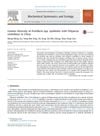 39 citations,
September 2012 in “Human Reproduction”
39 citations,
September 2012 in “Human Reproduction” Certain genetic variations in the SHBG gene are linked to an increased or decreased risk of PCOS in Mediterranean women.
 2 citations,
July 2015 in “Biochemical Systematics and Ecology”
2 citations,
July 2015 in “Biochemical Systematics and Ecology” Different types of Armillaria fungus have a high genetic variety when partnering with Polyporus umbellatus mushrooms in China.
 19 citations,
November 2010 in “PubMed”
19 citations,
November 2010 in “PubMed” New genetic insights have improved understanding of hair loss, leading to a new test and treatments, but more research is needed on the test and laser comb effectiveness.
 September 2024 in “Journal of Investigative Dermatology”
September 2024 in “Journal of Investigative Dermatology” A new tool can analyze hair to detect changes due to hormones, genetics, and aging.
 38 citations,
February 2012 in “British Journal of Dermatology”
38 citations,
February 2012 in “British Journal of Dermatology” AR/EDA2R gene linked to early-onset female hair loss, but 20p11 gene not involved.
 1 citations,
November 2017 in “Expert opinion on orphan drugs”
1 citations,
November 2017 in “Expert opinion on orphan drugs” Scientists now better understand the genetics of hypohidrotic ectodermal dysplasia, leading to more accurate diagnoses and potential new treatments.
 139 citations,
December 2020 in “Cell Stem Cell”
139 citations,
December 2020 in “Cell Stem Cell” Male hormones affect COVID-19 severity and certain drugs targeting these hormones could help reduce the risk.
 August 1994 in “Molecular Endocrinology”
August 1994 in “Molecular Endocrinology” Changing protein kinase levels in pituitary cells affects calcium flow and beta-endorphin release.
30 citations,
November 2019 in “Genetics selection evolution” Chinese domestic goats have unique genetic traits due to domestication and geographic isolation.
 15 citations,
January 2010 in “Experimental Dermatology”
15 citations,
January 2010 in “Experimental Dermatology” Hair loss in certain young mice is linked to a specific gene and can be caused by lack of iron.
 18 citations,
August 2018 in “The FASEB journal”
18 citations,
August 2018 in “The FASEB journal” Rabbits lacking the Hoxc13 gene show similar hair and skin issues to humans with ECTD-9, making them good for research on this condition.
 9 citations,
July 2022 in “EMBO molecular medicine”
9 citations,
July 2022 in “EMBO molecular medicine” Blocking certain immune signals can reduce skin damage from radiation therapy.
 47 citations,
August 2014 in “The Journal of Clinical Endocrinology and Metabolism”
47 citations,
August 2014 in “The Journal of Clinical Endocrinology and Metabolism” The research suggests that the global distribution of PCOS is likely due to historical human migration and that genes affecting PCOS may have different impacts on males and females.
9 citations,
July 2016 in “Genes” Genetic variants in PDE6H and LPAR6 cause vision impairment and hair loss in two Pakistani brothers.
1 citations,
January 2022 in “Annals of Dermatology” A new mutation in the MBTPS2 gene causes a mild form of IFAP syndrome.
 August 2024 in “Archives of Dermatological Research”
August 2024 in “Archives of Dermatological Research” Certain genetic variants and pathways are linked to hair loss.
75 citations,
September 2007 in “Journal of Heredity” FGF5 gene mutations cause long hair in domestic cats.
 May 2022 in “Rossijskij žurnal kožnyh i veneričeskih boleznej”
May 2022 in “Rossijskij žurnal kožnyh i veneričeskih boleznej” Alopecia areata is complex, often recurring, and needs personalized treatment, especially with other health issues.
166 citations,
November 2008 in “Expert Review of Endocrinology & Metabolism” Biotin and biotinidase are essential to prevent health issues, and deficiencies require lifelong supplementation.
 1 citations,
March 2022 in “bioRxiv (Cold Spring Harbor Laboratory)”
1 citations,
March 2022 in “bioRxiv (Cold Spring Harbor Laboratory)” Low-coverage sequencing is a cost-effective way to identify genes related to wool traits in rabbits.
2 citations,
July 2022 in “Journal of the Endocrine Society” Some women with PCOS have rare genetic variants linked to the condition.
 17 citations,
June 2017 in “Gene”
17 citations,
June 2017 in “Gene” A rare genetic mutation found in an Indian family can be detected through prenatal screening.
 14 citations,
April 2019 in “Genes”
14 citations,
April 2019 in “Genes” Researchers found a genetic region that influences the number of coat layers in dogs.
 1 citations,
January 2022 in “Cell Biology International”
1 citations,
January 2022 in “Cell Biology International” Changing CDK4 levels affects the number of stem cells in mouse hair follicles.
 February 2023 in “Research Square (Research Square)”
February 2023 in “Research Square (Research Square)” Genetic testing confirmed a rare skin disorder in a young girl, which improved with zinc supplementation.
 721 citations,
October 2011 in “Nature”
721 citations,
October 2011 in “Nature” Different types of long-lasting stem cells are responsible for the growth and upkeep of the mammary gland.
62 citations,
January 2015 in “Journal of Dermatological Science” New genetic discoveries may lead to better treatments for alopecia areata.
 3 citations,
December 2018 in “Meta Gene”
3 citations,
December 2018 in “Meta Gene” Certain gene variations increase male hair loss risk, influenced by hormone levels.
44 citations,
December 2005 in “Journal of Investigative Dermatology” Certain genetic markers, especially the MICA gene, are linked to alopecia areata.
 August 2024 in “Applied Sciences”
August 2024 in “Applied Sciences” Plant extracts may help prevent or reverse hair graying.





















